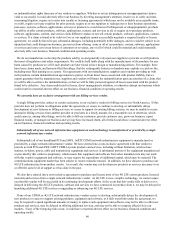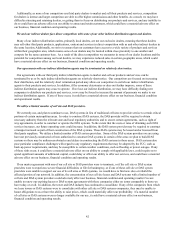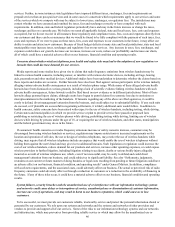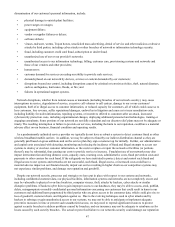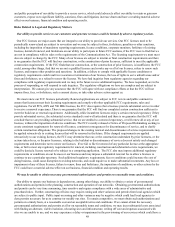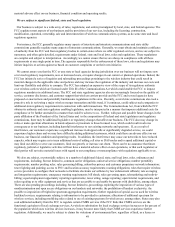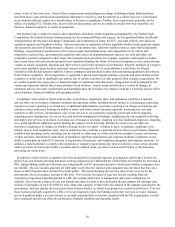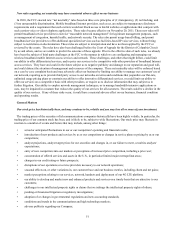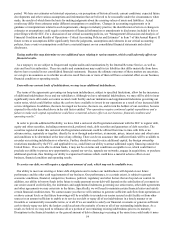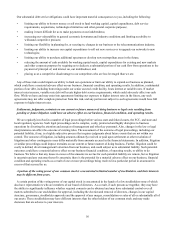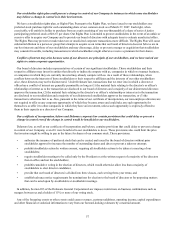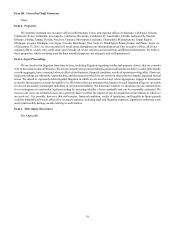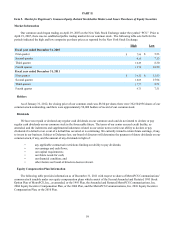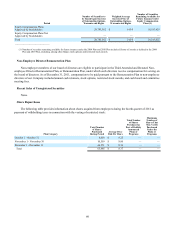Metro PCS 2011 Annual Report Download - page 61
Download and view the complete annual report
Please find page 61 of the 2011 Metro PCS annual report below. You can navigate through the pages in the report by either clicking on the pages listed below, or by using the keyword search tool below to find specific information within the annual report.50
owner of any of our tower sites. Some of these requirements and pending proceedings, including without limitation those
described above, pose technical and operational challenges to which we, and the industry as a whole, have not yet developed
clear solutions and may require us to spend money to become in compliance. Further, these requirements generally are the
subject of pending FCC, federal, state, local or judicial proceedings, and we are unable to predict how they may affect our
business, financial condition or results of operations.
Our business also is subject to various other regulations, including certain regulations promulgated by the Federal Trade
Commission, the Federal Aviation Administration, the Environmental Protection Agency, the Occupational Safety and Health
Administration, the Securities Exchange Commission, the Department of Labor, the FCC, and other federal, state and local
regulatory agencies and legislative bodies. Adverse decisions or regulations of these regulatory bodies could negatively impact
our operations and costs of doing business. Because of our smaller size, relatively smaller resources, more limited spectrum
holdings, concentration of operations in a few states in major metropolitan areas, and composition of our current and
prospective customer base, governmental regulations and orders can disproportionately increase our costs and affect our
competitive position compared to other larger telecommunications providers. For example, legislative and regulatory bodies
have raised issues and concerns and proposed new legislation limiting the ability of American companies to use certain foreign
vendors to supply equipment, materials and other services used in the operation of our business. Recently members of Congress
and certain regulatory agencies have expressed concern with regard to the US trade imbalance with China, the alleged
violations of intellectual property rights by Chinese companies and potential security risks purchasing equipment and software
from Chinese companies. If new legislation or regulation is passed restricting the purchase of goods and services from certain
countries, it could result in significant cost and the loss of certain economies of scale garnered from extensive negotiations. We
are unable to predict the scope, pace or financial impact of regulations and other policy changes that could be adopted by the
various governmental entities that oversee portions of our business. As previously noted herein, a variety of changes in
regulatory policies are under consideration and depending upon the outcomes, the changes could have a material adverse effect
on our business, financial condition and operating results.
Compliance with current or future federal, state, or local laws, regulations, rules, and ordinances could have a material
adverse effect on our business, financial condition and operating results, including but not limited to, increasing our operating
expenses or costs, requiring us to obtain new or additional authorizations or permits, requiring us to change our business and
customer service processes, limiting our ability to attract and retain certain customer segments, increasing our costs and
expenses to offer services, increasing the costs of our services to our customers, requiring system and network upgrades,
requiring greater transparency for our services and network management techniques, lengthening the time required to develop
and deploy new services or products, increasing cost of insurance coverage, requiring us to hire additional employees, requiring
us to spend significant additional capital, limiting the capacity of our networks, limiting the services we can offer our
customers, requiring us to change our business strategy and service plans. A failure to meet, or maintain compliance with,
federal, state or local regulations, laws, rules or ordinances also could have a material adverse effect on our business, financial
condition and operating results, including, but not limited to, subjecting us to fines, forfeitures, penalties, license revocations,
or other sanctions, including the imposition of mandatory reporting requirements and corporate monitors, limitations on our
ability to participate in future FCC auctions or acquisitions of spectrum, and compliance programs and corporate monitors. In
addition, a material failure to comply with regulations or statutory requirements may limit our ability to draw certain amounts
under our senior secured credit facility or could result in a default under our senior secured credit facility or the indentures
governing our senior notes.
In addition, certain wireless companies who have participated in spectrum auctions as designated entities have become the
target of qui tam lawsuits claiming that those wireless companies have defrauded the United States Government by investing in
DEs, taking bidding credits and otherwise receiving benefits in FCC spectrum auctions to which such wireless companies were
not entitled. Qui tam lawsuits generally are filed under seal in the first instance and companies may not know that they are a
target of such a lawsuit unless and until it is made public. The person bringing the suit may share in any recovery by the
government, which encourages lawsuits of this kind. If we become the target of a qui tam lawsuit resulting from our
acquisition of spectrum originally granted to a DE, the resulting distraction to management and costs to defend may be
material. If we become a target of a qui tam lawsuit and either is found to have defrauded the government, the damages may
include civil penalties of up to $11,000 for each claim, plus a penalty of three times the amount of the damages sustained by the
government, and may include the revocation of any licenses held by us, which were granted as a result of such fraud. If we lost
those licenses originally acquired by a DE or if we are required to repay the bidding credits they received, or to pay damages
and civil penalties under a qui tam lawsuit, or an audit concluded that we had not complied with the DE requirements, it could
have a material and adverse effect on our business, financial condition and operating results.


